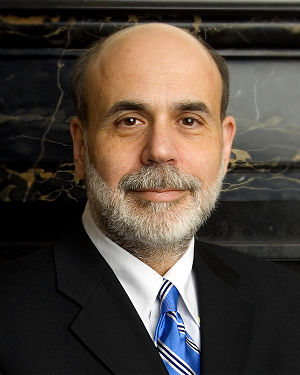The U.S. currently boasts some
500 barter exchanges, up from about 40 in 1980, and that's the official count; many businesses barter informally to avoid the IRS.
The depth and length of Depression 2.0 will be the most severe depression in history. When the unemployment benefits run out for great swaths across America, who will they turn to when bankrupt states slash welfare and food stamp programs? As our global economy comes to a full stop, trade will begin to flourish in local communities out of necessity.
But there's another even more important reason to barter -- to destroy the Federal Reserve. Congress will never reform the banking system. Congress, bankers, Wall Street, The Federal Reserve, are all fleecing the system of taxpayer wealth. Government officials, economists, and financial pundits would like all of us to believe the nature of our current financial crises results from a complex series of events, but it's really very simple: the elite (Wall Street bankers and their whore political system) have robbed taxpayers blind in the largest transfer of wealth in history.
Read what the author of
The End of Money and the Future of Civilization,
Thomas H. Greco, has to say about banking, bartering, and the Federal Reserve:
Historically, every financial and economic crisis has been used to further centralize power and concentrate wealth. This one is no different, and in fact the moves being promoted by the Obama administration and the central banks of the Western powers will take the whole world to the pinnacle of financial despotism -- unless enough people wake up and claim their own "money power.”
In recent months, the Fed has expanded its "assets" from about $800 billion to more than $2,000 billion. Those so-called assets are securities it bought from financial institutions and loans made to central banks in other countries. But the Fed refuses to name the specific recipients of those funds, while admitting that by doing so they are manipulating the value of the US dollar on foreign exchange markets. (Congressman Alan
Grayson Grills Fed Vice Chair Donald
Kohn.)
Where does the Fed get the money to buy those "assets" or to make those loans? Quite simply, it creates the money. Unlike you or me or any other economic entity, the Fed has the power to create Federal Reserve dollars by effectively writing a check against no funds. This is the function known as "Open Market Operations."
What is the economy experiencing now, and what is in prospect for the future? Despite unprecedented inflation of the money supply, we are now (mid-July, 2009) in a period of depression. How can we have simultaneous inflation of the currency and still have economic depression?
It is a matter of where the money is going. While the public sector (federal government) is being lavishly funded to maintain a global empire, and the banks are being bailed out to try to keep a dysfunctional and destructive financial system from collapsing, the private productive sector is being starved for credit. As a result, businesses are bankrupting, people are losing their jobs and their incomes, and lower levels of government are being squeezed because their tax revenues are shrinking.
There is also the matter of the real estate bubble that was created by the financial institutions as they loaded up the private sector with a debt burden that was way beyond its ability to bear. Now that burden is being shifted to the public sector as the government assumes those "toxic" loans. Unfortunately, it is not the poor suckers who were lured into the debt trap that are being relieved, but the predatory lenders who laid the traps. So mortgages are being foreclosed at an unprecedented scale, people are losing their equity as housing values plunge, and more Americans are being made homeless.
These are the factors that have so far kept the effects of monetary inflation from becoming extreme. Ultimately, however, such abusive issuance of political money shows up as rising prices.
When will the price effects of hyper-inflation begin to kick in? How will the government respond to it? What will be the social and political fallout? What can ordinary people do to protect themselves from monetary and legislative abuses? These are the questions that beg for answers.
Already there are rumblings and signs that the U.S. dollar is about to lose its status as the global reserve currency. When that happens, imports of energy and other necessities will become more expensive. The U.S.’s massive trade deficits will not be sustained into the future. China, the OPEC countries, and others that have been buying massive amounts of U.S. government bonds with their dollar earnings, are indicating that their appetite has been sated. Bilateral and multilateral trade agreements are being made that bypass the use of the dollar for international trade.
One thing is clear -- we cannot rely upon the government to act in the best interests of the people. Already, President Obama has moved to give the Federal Reserve even more power to control the people's credit and financial resources. According to a June 18 article in the Wall Street Journal, "The central bank would win power to monitor risks across the financial system, and sweeping authority to examine any firm that could threaten financial stability, even if the Fed wouldn't normally supervise the institution." This is not a new plan; it was floated as a trial balloon during the Bush administration. As early as March 2008, then Treasury Secretary
Paulson was proposing to "give the Federal Reserve broad new authority to oversee financial market stability, in effect allowing it to send SWAT teams into any corner of the industry or any institution that might pose a risk to the overall system."
Ostensibly that would be done to prevent the errant financial institutions from repeating their sins of the recent past, but more likely it will have the effect of suppressing any private initiative that might compete with the financial cartel. The Fed is, after all, a private company run by the bankers for the bankers. A recent Reuters article is critical of
Obama's move because of the Fed's lack of accountability. It is a plan that seeks to preserve at all costs the credit monopoly that exists under the central banking regime and to perpetuate the looting of the economy by
monetization of federal government debts and other ultimately worthless "assets."
During the Great Depression, President Franking Roosevelt, upon taking office in 1933, declared a "bank holiday." He ordered all banks to close. Many of those banks never reopened and many people lost their savings. He also demanded that all Americans turn in their gold holdings in return for paper currency, which was one of the biggest robberies in history up to that time. Some pundits are predicting that another such bank holiday is being planned to put the brakes on price increases, once they begin in earnest, by depriving people of access to their savings, as was done in Argentina in 2002.
Governments that mismanage money invariably use the force of law to prevent the sheep from escaping from the shearing pen (or the slaughter house). So long as people are completely dependent upon political money and banks, they will docilely (or grudgingly) accept whatever "solutions” the political leadership puts forth, and do whatever the government demands of them.
Fortunately there is a way out. The primary purpose of money is to facilitate the exchange of goods and services in the markets. But it is possible to mediate the exchange process without using political money as the payment medium, and without borrowing from banks.
There is plenty of precedent for this sort of cashless trading. It involves a process of direct credit clearing among associated buyers and sellers. During the Great Depression the entrepreneurial middle class in Switzerland organized themselves into the
WIR Economic Circle Cooperative. After 75 years, the
WIR clearing circle continues to thrive with more than 60,000 member businesses trading the equivalent of about US$1.3 billion per year.
The past four decades have seen the emergence of a new industry comprised of commercial trade exchanges, sometimes called "barter" exchanges, that act as "third part record keepers" enabling the same sort of direct credit clearing for thousands of businesses in cities around the world. Efforts at the grassroots by social entrepreneurs to localize exchange and finance have been similarly widespread in many communities over the past twenty-five years.
Measures to properly reform the money and banking system by political means have about as much chance as the proverbial snowball in hell. However, what is possible, and what seems to be gaining traction to transcend the dominant system, is the materialization of voluntary, private initiatives that enable the cashless exchange of goods and services. As these systems continue to improve, proliferate, and scale up, they will provide a pathway toward a sustainable economy, greater local control, and a better quality of life for all.
Thomas H. Greco, Jr. is the director of the Community Information Resource Center, which he founded in 1992. CIRC is a nonprofit consulting organization and networking hub dedicated to economic equity, social justice, and community improvement, specializing in community currency and mutual credit design, development, and implementation. His newest book is The End of Money and the Future of Civilization.







![Reblog this post [with Zemanta]](http://img.zemanta.com/reblog_e.png?x-id=24c648a3-7caa-41d8-86ae-79b2a8258b39)

![Reblog this post [with Zemanta]](http://img.zemanta.com/reblog_e.png?x-id=3f6d7340-57c4-4555-9e8e-b7c232d8c091)